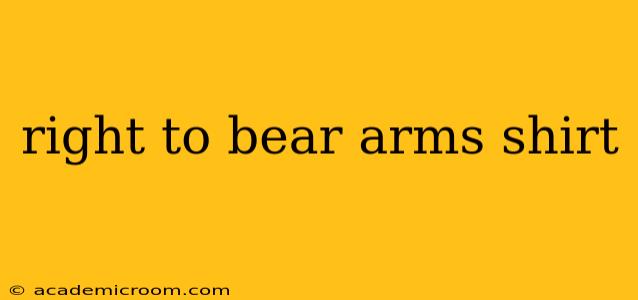The right to bear arms is a deeply debated topic in many countries, and this sentiment is often reflected in clothing choices. Right to bear arms shirts represent a wide spectrum of opinions, from celebrating gun ownership to advocating for stricter gun control. This guide will explore the various types of shirts, their implications, and the ongoing conversation surrounding this powerful symbol.
What Does a "Right to Bear Arms" Shirt Symbolize?
A "right to bear arms" shirt typically symbolizes the wearer's belief in the importance of the Second Amendment in the United States (or similar constitutional rights in other countries). This often translates to a belief in self-defense, the right to own firearms for hunting or sport shooting, and a resistance to stricter gun control measures. However, the symbolism can be nuanced. Some designs might focus on specific aspects, like historical firearms or hunting traditions, while others might incorporate more overtly political messages. It's crucial to understand that the meaning can vary widely based on the specific design and the wearer's personal interpretation.
Different Types of Right to Bear Arms Shirts
The designs and styles of right to bear arms shirts are diverse. Some common variations include:
- Simple Text Shirts: These shirts often feature straightforward text like "2A" (referencing the Second Amendment), "Right to Bear Arms," or related slogans.
- Graphic Tees: Graphic tees often showcase images of firearms, patriotic symbols like the American flag, or hunting scenes. The imagery can range from subtle to overtly aggressive.
- Vintage-Inspired Designs: Some shirts incorporate vintage or retro designs, creating a nostalgic feel while still conveying the message.
- Political Statement Shirts: These shirts might incorporate political messaging or slogans, explicitly aligning themselves with specific political parties or ideologies.
What are the different interpretations of the "Right to Bear Arms"?
Interpretations of the "right to bear arms" vary significantly, leading to heated debates. The core of the debate revolves around the balance between individual liberty and public safety.
Pro-Gun Rights Interpretations:
Proponents of stronger gun rights emphasize self-defense, the right to own firearms for hunting or sport, and the protection of individual liberty against potential government overreach. They often argue that gun ownership is a deterrent to crime and that stricter gun control measures infringe upon their constitutional rights.
Gun Control Advocacy Interpretations:
Advocates for stricter gun control prioritize public safety and reducing gun violence. They argue that the current laws are insufficient, and stronger regulations are needed to prevent mass shootings, suicides, and accidental deaths related to firearms. They may support initiatives like background checks, restrictions on certain types of firearms, and red flag laws.
What are the ethical considerations of wearing a Right to Bear Arms shirt?
Wearing a "right to bear arms" shirt carries significant ethical considerations. It’s a statement that can evoke strong emotions and potentially alienate others. The wearer should be mindful of the message they are conveying and the potential impact on those around them. Context is crucial; wearing such a shirt at a political rally carries different implications than wearing it at a family gathering.
How are these shirts used in political discourse?
Right to bear arms shirts frequently appear in political discourse, serving as visual symbols of political affiliation and ideology. They're worn at rallies, protests, and other political events, signaling support for particular candidates, parties, or policy positions. The presence of these shirts can significantly impact the tone and atmosphere of these events.
Are there legal implications associated with wearing a Right to Bear Arms shirt?
Generally, there are no legal implications for simply wearing a "right to bear arms" shirt. However, the content of the shirt and the context in which it is worn could potentially lead to legal consequences under specific circumstances. For instance, wearing a shirt that incites violence or threatens others could be illegal.
In conclusion, "right to bear arms" shirts are more than just clothing; they represent complex and deeply held beliefs about individual rights, public safety, and the role of government. Understanding the various interpretations and the ethical considerations associated with them is vital to navigating the often-charged discussions surrounding this powerful symbol.
